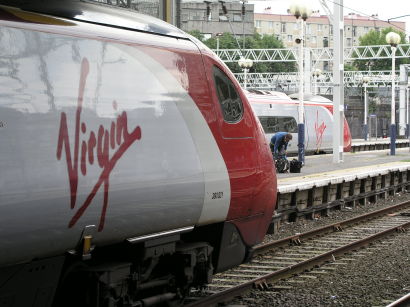THE DEPARTMENT FOR TRANSPORT has not yet signed the controversial West Coast contract with FirstGroup after the 'cooling off' period ended, but the DfT is declining to say whether the delay has been caused by the legal challenge from Virgin. Virgin, which came second, is alleging that the process was flawed, which the DfT denies.
Virgin has lodged a preliminary claim with the High Court which says the transport secretary failed to take a 'risk adjusted view of the premium offered by the bidder'.
It maintains that 'on the basis of information presently available, there is no evidence that the Secretary of State undertook the relevant analysis'.
The core of the argument centres on two issues. One is the level of growth which can be expected and the other is the closely linked factor of revenue, from which premiums must be paid.
FirstGroup is forecasting average annual growth of 10.4 per cent, while Virgin expects 8.5 per cent. The total premiums, at net present value, would be £5.5 billion from First, as against £4.8 billion from Virgin.
A further point of contention is the timetable for premium payments, which First has 'back-weighted' more tham Virgin. The effect is that First will pay a larger proportion of its premiums in the last few years of the contract, which lasts for 13 years and 4 months. There is also a possible extension of 20 months.
Critics of First have claimed that extreme 'back-weighting' raises doubts over whether the last few payments could in fact be made.
Virgin is also attacking the lack of information which has been provided to it, as a failed bidder, since the announcement was made on 15 July. It says the Dft has 'repeatedly' refused to anwer some 40 questions about the bid, and is quoting European case law which says a contracting authority must provide “an adequate statement of reasons to unsuccessful tenderers”.
In reply to the claim from Virgin, the DfT says it does not accept that transport secretary Justine Greening 'acted unreasonably and/or committed a manifest error in her treatment of the FirstGroup bid'.
A Department for Transport spokesman added: “We will fight these claims robustly and show clearly that these allegations by Virgin and their business partners Stagecoach are ill-founded and misconceived. We expect to sign the contract soon."
Meanwhile, First has insisted that its business plan is realistic and achievable, saying that cheaper seats will be sold more effectively under a new yield management system. It is also planning to introduce 11 six-car electric trains on the Birmingham-Glasgow route by 2016 as well as serve several new destinations, which include Shrewsbury and Blackpool. It also said it had 'every confidence' in the bidding process, which had been 'rigorous, detailed and fair'.


